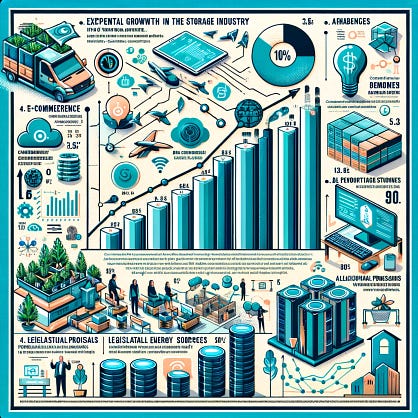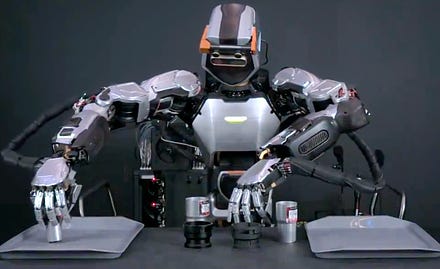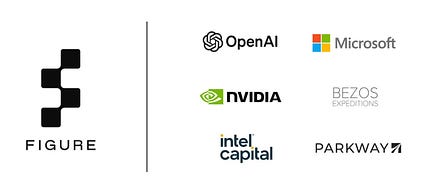Happy Friday Team, Musk is in the news cycle again. Now he is suing OpenAI, is he right or plain jealous? Also, data centers are booming, presenting a lucrative financial landscape yet posing significant environmental risks. Also, the robotics revolution is gaining momentum, attracting substantial investment and reshaping industries.
❓Quiz of the DayWhat is Machine Learning?
Please give us your answer in the comments below. The correct answer will be given in the next newsletter - Last Week’s Quiz correct answer: “B” 📰 AI News and Trends
🌐 Other Tech news
AI Expansion Strains Data Center Sustainability.In the last decade, the storage sector has seen remarkable growth, with an expected annual increase of 10%. The rise of e-commerce platforms like Shein and Temu, which challenge Amazon by offering more affordable goods, has intensified consumer habits. This boom in consumer products has led to a high demand for storage solutions, as both individuals and businesses struggle to manage their increasing possessions, often incurring high costs for storage space. Parallelly, the digital domain is experiencing a similar situation. Advancements in AI are propelling data production to new heights, overwhelming digital storage capacities as both humans and machines generate vast amounts of data. This surge has placed unprecedented pressure on data centers, escalating sustainability concerns. Efforts to mitigate these challenges include the pursuit of renewable energy sources by companies such as Lancium, aiming to minimize the environmental impact of their energy-intensive operations. However, the rapid expansion of AI, exemplified by Nvidia's 217% increase in revenue to $47.5 billion in 2023, is outpacing green energy initiatives, highlighting the urgent necessity for efficient and sustainable solutions. In response, legislators are proposing measures to ensure data centers meet sustainability goals, underlining the imperative of balancing technological advancement with environmental stewardship. This scenario underscores the critical need for innovation within the storage and data center industries to sustainably manage the dual challenge of physical and digital excess. Get a FREE 1-on-1 AI Session for you and your team when you refer 2 people. Refer 10 and get a $50 Amazon Card. Humanoids are Here to Stay.The future of robotics is on a trajectory toward more sophisticated, autonomous humanoid robots capable of performing a wide range of tasks, from industrial applications to everyday chores. Companies like Sanctuary AI, Figure AI, Tesla, and Agility Robotics are at the forefront of this evolution, each contributing unique innovations to the field. Sanctuary AI's Phoenix robot, noted for its unparalleled hand dexterity and speed, represents a step change in robotics, emphasizing precision, speed, and strength in robotic hands. Figure AI, backed by giants such as Microsoft, OpenAI, Nvidia, and even Jeff Bezos, aims to revolutionize the labor market with AI-powered humanoid robots, enhancing them with the ability to understand and process language through partnerships with OpenAI. And the Tesla’s Optimus has advanced its dexterity and capabilities and will retail for ~$20K Pros of the Robotics Revolution:1. Labor Shortage Solutions: Robots can fill millions of undesirable or unsafe jobs, addressing labor shortages in sectors like manufacturing. 2. Efficiency and Productivity: With capabilities such as performing tasks at near-human speeds and learning through AI, robots can increase productivity and efficiency in various industries. 3. Innovation and Economic Growth: Investments and advancements in robotics fuel innovation, potentially leading to economic growth and new industries. Cons of the Robotics Revolution:1. Job Displacement: As robots take on more roles, there could be displacement of workers, leading to societal and economic challenges. 2. High Costs: The development, maintenance, and implementation of advanced robots involve significant costs, potentially limiting access for smaller businesses. 3. Ethical and Safety Concerns: The integration of AI into robots, especially those capable of learning and autonomous decision-making, raises ethical and safety concerns about their use and the potential for unforeseen consequences. The robotics revolution is driven by rapid advancements in AI and machine learning, with key players focusing on enhancing robots' physical and cognitive capabilities. This evolution promises to transform industries and everyday life but also necessitates careful consideration of its broader implications on the workforce, society, and ethical standards. Musk sues OpenAI. Is he right or just jealous?Elon Musk has filed a lawsuit against OpenAI and its CEO, Sam Altman, alleging that the company prioritized profit over public benefit, contrary to its founding principles. Initially founded as a non-profit in 2015 by Musk, Altman, and others, OpenAI aimed to develop AI for the "benefit of humanity" and promised to make its advancements open source. However, Musk contends that OpenAI's partnership with Microsoft, turning it into a "closed-source de facto subsidiary," betrays this commitment. The legal battle underscores Musk's concerns over AI's risks, amidst broader scrutiny over OpenAI's practices, including regulatory investigations and other lawsuits. Elon Musk, among other tech leaders, called for a six-month pause in AI development in March 2023, citing potential risks to society. This move coincided with his efforts to launch his own AI company, xAI, and its chatbot, Grok. Grok, aimed to offer edgier, less politically correct responses than its counterparts, has faced criticism for not aligning with Musk's anti-'woke' vision, generating controversy for its responses on topics like diversity and transgender rights. Despite Musk's intention for Grok to challenge the dominant AI players by providing unfiltered content, the platform has struggled to meet these expectations, leading to public frustrations, including from Musk himself. This lawsuit underscores a pivotal moment in Musk's conflict with OpenAI, where he seeks over $44 million in restitution and demands the company revert to its open-source ethos. It symbolizes a deeper dive into OpenAI's transition from a non-profit to a profit-driven model, highlighting the friction between Musk's vision for his AI venture, Grok, and the broader challenges and expectations facing AI innovation. This legal action not only reflects competitive and ideological clashes within the AI sector but also questions the balance between technological advancement and societal good. 📰 Publications I am currently reading and recommending:
🧰 AI ToolsCustomer Support
🚀 Showcase Your Innovation in the Premier Tech and AI Newsletter (link) As a vanguard in the realm of technology and artificial intelligence, we pride ourselves in delivering cutting-edge insights, AI tools, and in-depth coverage of emerging technologies to over 55,000+ tech CEOs, managers, programmers, entrepreneurs, and enthusiasts. Our readers represent the brightest minds from industry giants such as Tesla, OpenAI, Samsung, IBM, NVIDIA, and countless others. Explore sponsorship possibilities and elevate your brand's presence in the world of tech and AI. Learn more about partnering with us. You’re a free subscriber to Yaro’s Newsletter. For the full experience, become a paying subscriber. Disclaimer: We do not give financial advice. Everything we share is the result of our research and our opinions. Please do your own research and make conscious decisions. |
Friday, March 1, 2024
⚖️ Is Musk right in suing OpenAI or just jealous?
Subscribe to:
Post Comments (Atom)




No comments:
Post a Comment